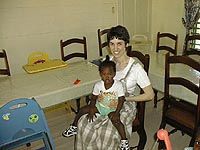Needs / Ways You Can Help
 |
Economically, Jamaica is the third poorest nation in the Caribbean, and this poverty is particularly pervasive in the rural areas. The 1998 edition of World Outlook (by the highly respected Economic Intelligence Unit) ranks Jamaica second to last (after Turkmenistan) in the entire world for growth prospects.
Estimates of severe under-employment in the diocese run as high as forty percent. Lack of work opportunities causes many young people to leave the diocese. They migrate to the capital, Kingston, or leave Jamaica.
The average worker does not earn enough to pay for the minimum essentials of daily life. Thus, the average Sunday collection in most of the parishes is approximately $US20 and in the smaller parishes only $US8.
is finding ways to fund the monthly stipends and housing costs
of his priests and sisters.
The average weekend collection at a parish in Mandeville might be between 10 & 20 U.S. dollars. Thus, Bishop Boyle has to find ways to support the missionaries who are helping him. Each priest receives the equivalent of U.S. 140 dollars, and each sister receives the equivalent of 160 U.S. dollars (the difference in the stipend arises from the fact that priests are allowed to accept Mass stipends. Unfortunately, Mass stipends are virtually non-existent in Jamaica.)
in your parish/ministry
be willing to make a commitment
for three years to any of the following?
Supporting a specific missionary (priest, sister, deacon, lay missionary) by monthly donation of an amount of your choosing ($25, $35, $50).
Supporting a specific priest with a specific number of Mass intentions each month.
Adopting a parish, a school, or a ministry in Mandeville and taking up a collection each month to support it.
Making a one-time donation of $50 toward the construction of a dwelling for homeless people in Jamaica.
Sponsoring a student in a Catholic school with a monthly donation of money the amount to be determined by you.
Procuring teaching aids, school desks, paper, pencils and crayons for a particular school in Mandeville.
Presently, only nine of the church communities have housing for the parish priest. Seven parishes and numerous mission stations are without a residence. Thus, the presence of the pastor is diminished when he must live elsewhere, often miles away from the place where he ministers. It is frequently impossible to find adequate rental housing, and the cost of such is exorbitant. Presently, three rectories and two convents are urgently needed.
Many of the simple one room church structures are utilized as schoolrooms during the week and serve approximately 75 children, taught by two teachers. Small portable dividers about 5' high separate the two groups. Children not only have a difficult time getting to school, but once they arrive, the learning environment is most unpleasant.
Each Friday, school desks and chairs are stacked against the wall as well as in the sacristy to prepare for the Sunday Eucharist. This creates a most unprayerful site for those who come to worship at the Sunday Liturgies. Monies are urgently needed to provide three elementary schools.
Schools, especially high schools, are urgently needed. The two high schools, which are located in the civil parishes of St. Elizabeth and Manchester, respectively, need to expand and refurbish their present structures. Only 1 out of 5 children of secondary school age have the opportunity to receive an education since there are insufficient places for the other 80%. Thus, many children terminate their education after grade six. This simply perpetuates the horrible cycle of poverty for the majority of the population. Enrollment in each of the diocesan secondary schools is at a maximum, and the facilities must be expanded to meet the needs.
The diocese has been extraordinarily blessed with dedicated men and women who have responded to the Church's missionary mandate. Pope John Paul II asserts that "missionary evangelization...is the primary service which the Church can render to every individual and to all humanity in the modern world." We are most grateful to all who have made a commitment to the Diocese of Mandeville in its efforts to carry out its mission of evangelization.
No comments:
Post a Comment